-
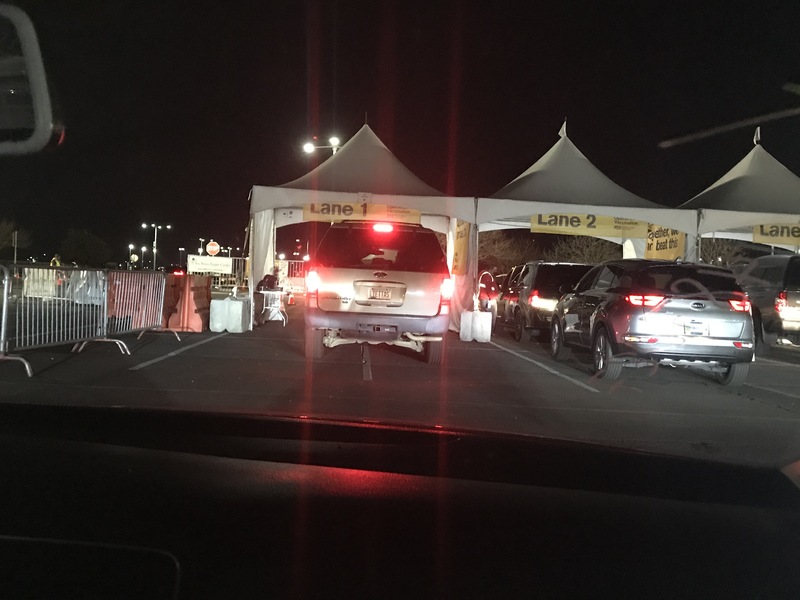
2021-03-16
I'd been trying to get a COVID vaccination appointment on the State of Arizona's website since late January. Finally, on the evening of Monday, March 15, I found a couple of slots open on the following evening at the State mass vaccination site at the Arizona Cardinals Stadium. It was about a 35-mile trip, and my wife drove me out there. Once we got to the site, everything went really smoothly and the staff were very pleasant. I got my first Pfizer dose and an appointment for April 6 for the second. It was nice to see the ASU banner at the site. Altogether, the travel time and the process on site took about an hour and forty-five minutes. I feel immensely relieved.
-
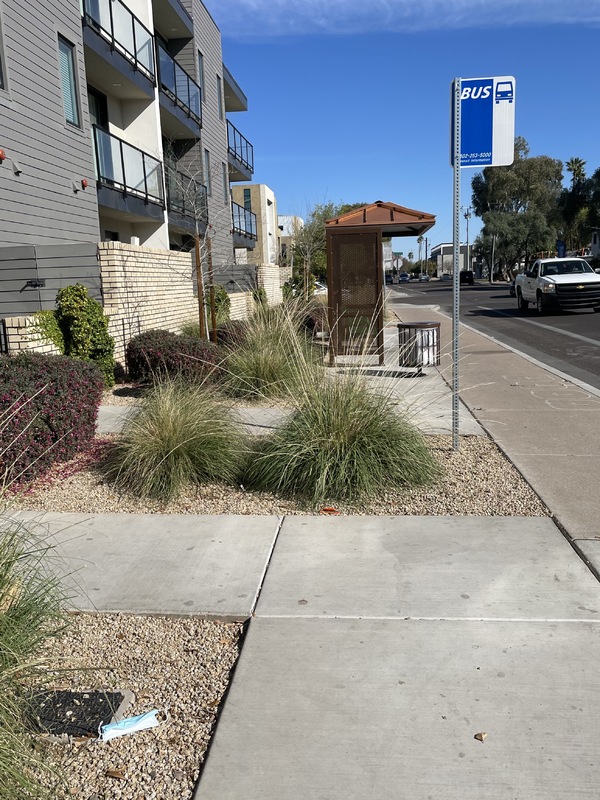
2021-03-17
Blue & white disposable face mask near the bus stop by Hardy & 5th in Tempe, Arizona.
-
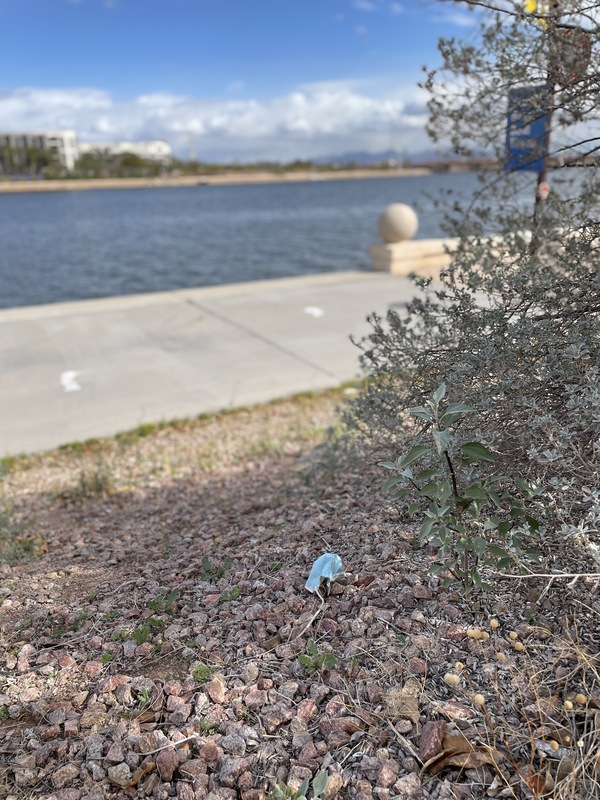
2021-03-16
Blue & white disposable face mask east of Rural road found along the South Bank of the riverwalk along Rio Salado.
-
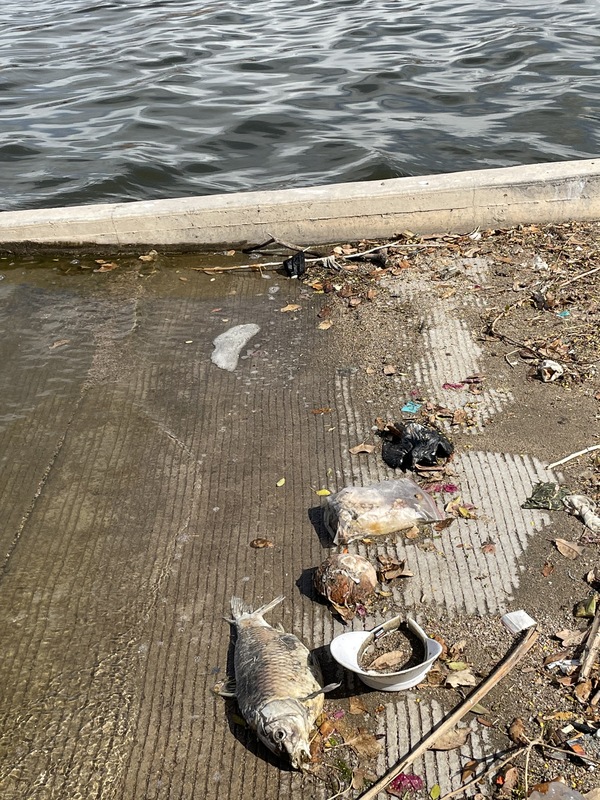
2021-03-16
Black fabric disposable mask draped over a stick at the boat launch near Tempe Beach Park. This photo shows a lot of other trash washed up here, including a dead fish.
-
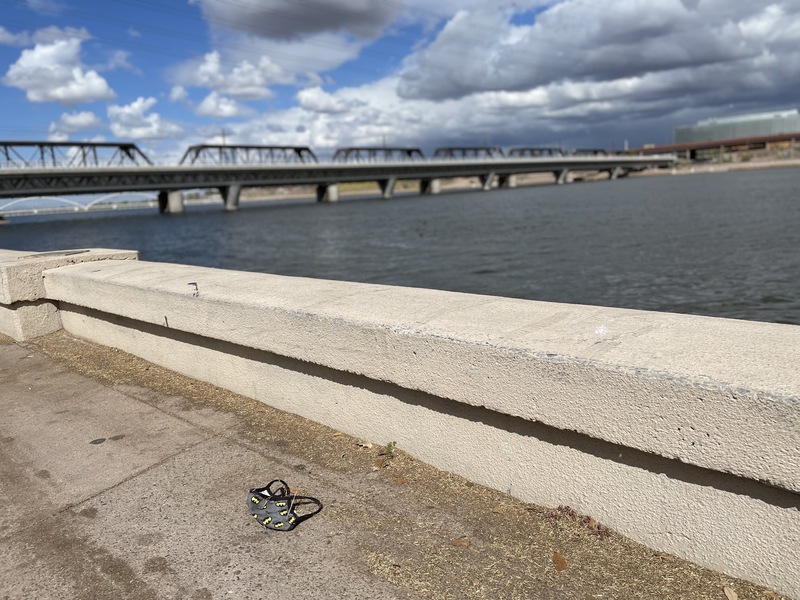
2021-03-16
Child's fabric face mask with a Batman print. This was found near Tempe Beach Park. I picked it up and brought it home as it was in pretty good condition. First, I'm soaking it in vinegar and then I'll wash for my 2yo to use.
-
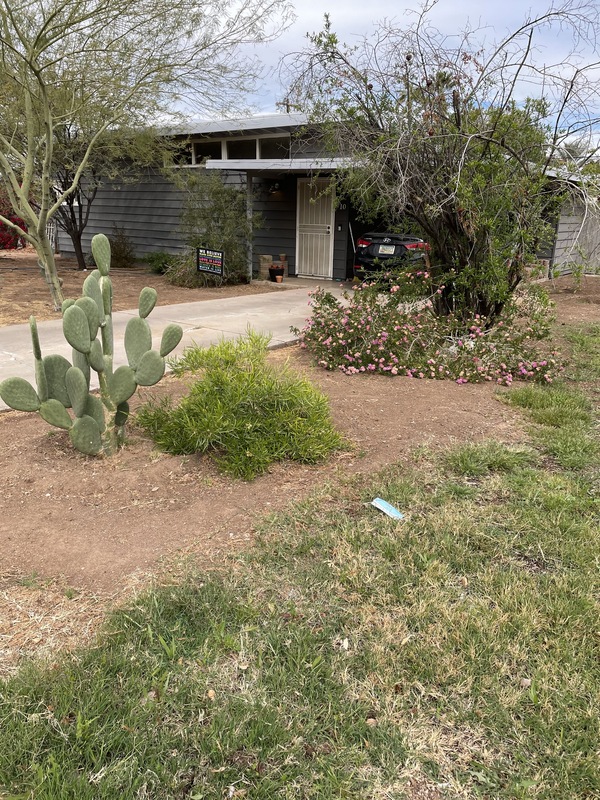
2021-03-15
Disposable mask trash near Mitchell Park.
-
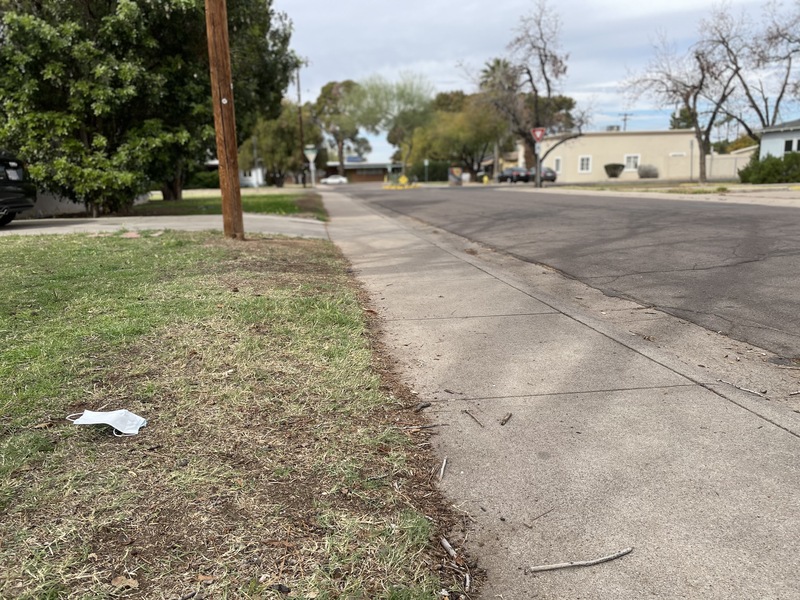
2021-03-15
White and blue disposable face mask found near 9th and Roosevelt in Tempe, Arizona.
-
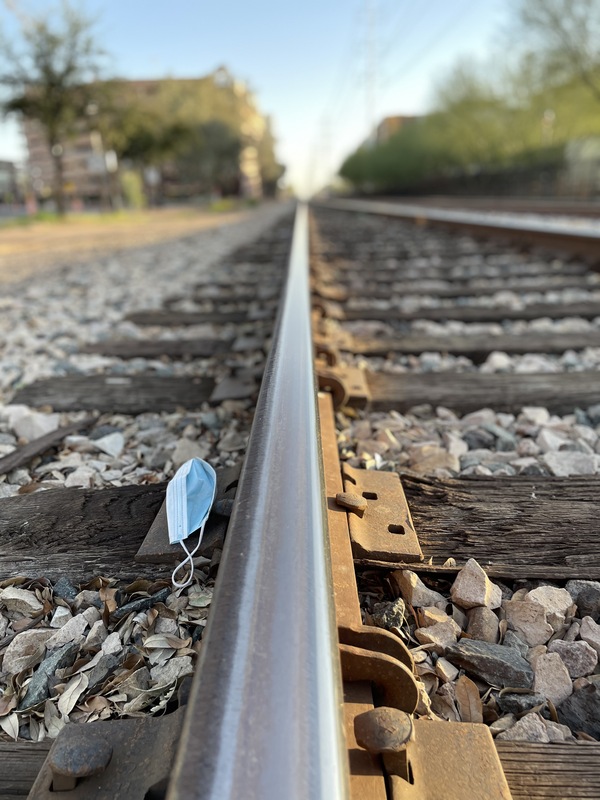
2020-03-08
White & blue disposable mask along the rail line. Found near the corner of Ash and 5th in downtown Tempe, AZ.
-
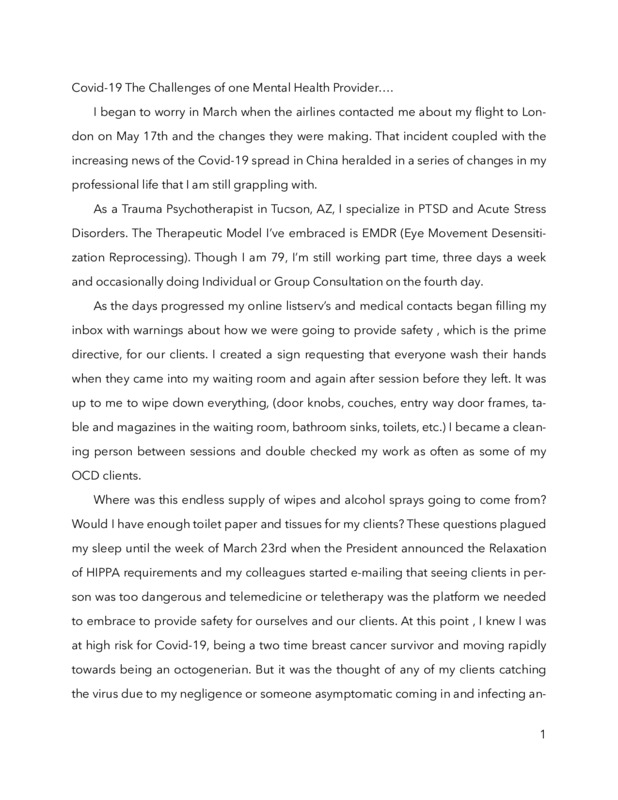
2020-05-16
Covid-19 changed the way we deliver Mental Health Services. This is my personal story of how it felt and what it required to provide Trauma Psychothery during the Pandemic.
-
2020-03-28
During the 2019-2020, I was living at Vista Del Sol, the apartment style housing available to upper division Barrett students at Arizona State University. I was fortunate to share my apartment with three close friends, and over the course of the school year, we had often gotten together with some of our other friends to hang out and enjoy the college lifestyle in our apartment. After we all returned from spring break, we discussed how uncertain our futures would be with the pandemic, and with so little information or precedent available to us, we all faced uncertain circumstances. Three of us were from Tucson, but our fourth roommate was an out of state student, but we all wanted to remain in our room until the conclusion of the semester (when we were sure the whole situation would be over). However, with added stress from our parents, we found out over the course of a week, that all of our parents expected us to return home, where they presumed we'd be safer and better monitored, instead of leaving us to our own devices. Packing and spending those moments together were heartbreaking, and would only be amplified in the coming months as we were unable to see each other and spend time together, even for special occasions such as birthdays or other events. As a last hurrah, the weekend before our first roommate moved out, we threw ourselves a little goodbye party, with a roommates photoshoot that we reference even now, a year later.
-
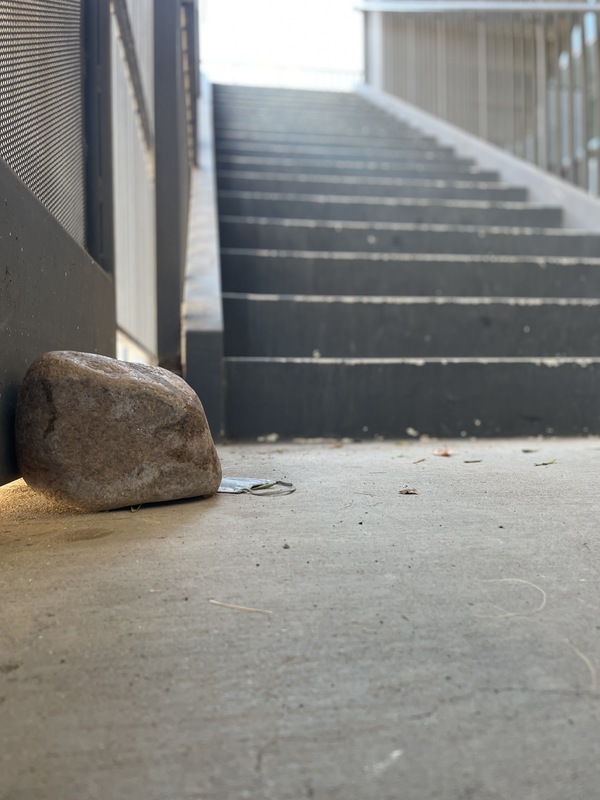
2021-03-06
It's rare to see trash or even discarded masks on campus. The university does a good job of keeping the grounds tidy and clean-looking. I found this mask near the back stairs of the COOR building.
-
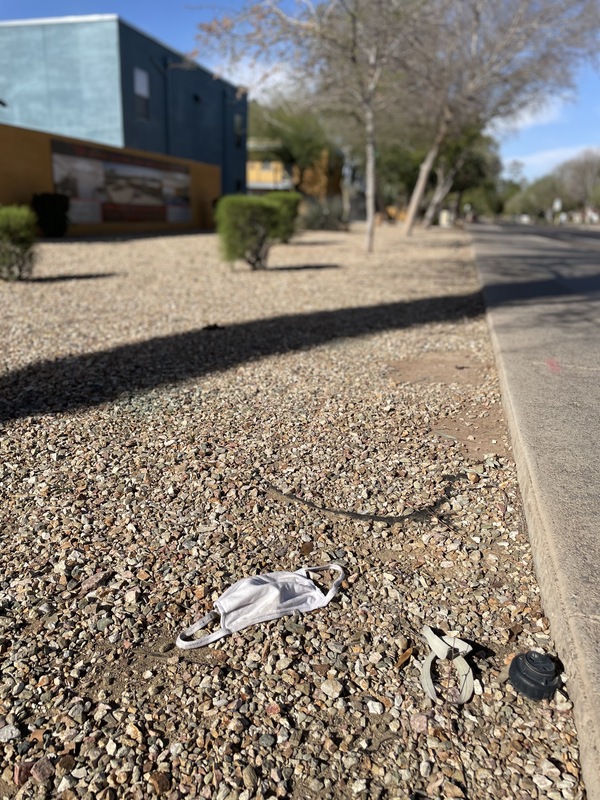
2021-03-06
I came across this white fabric mask while walking from home to the university. It was near the corner of Roosevelt and 5th.
-
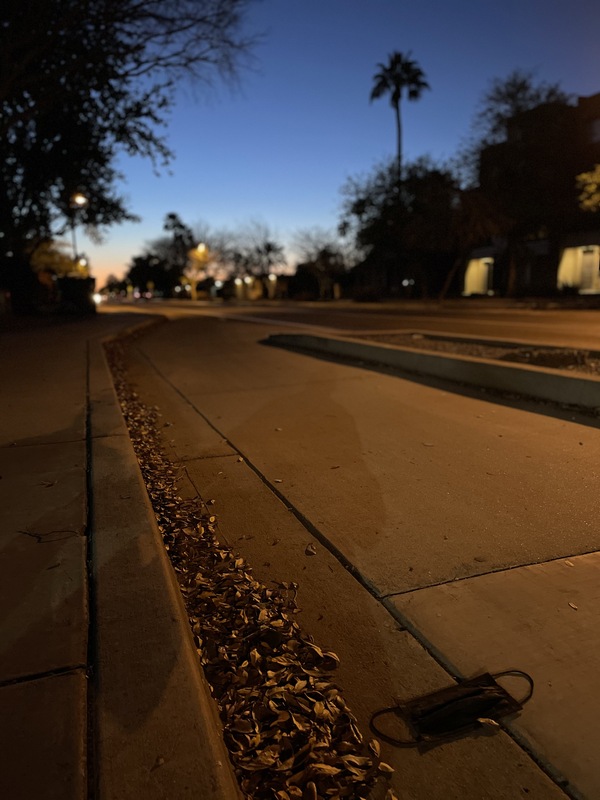
2021-03-04
Mask trash spotted on the walk back from Whole Foods near the intersection of 5th and Hardy.
-
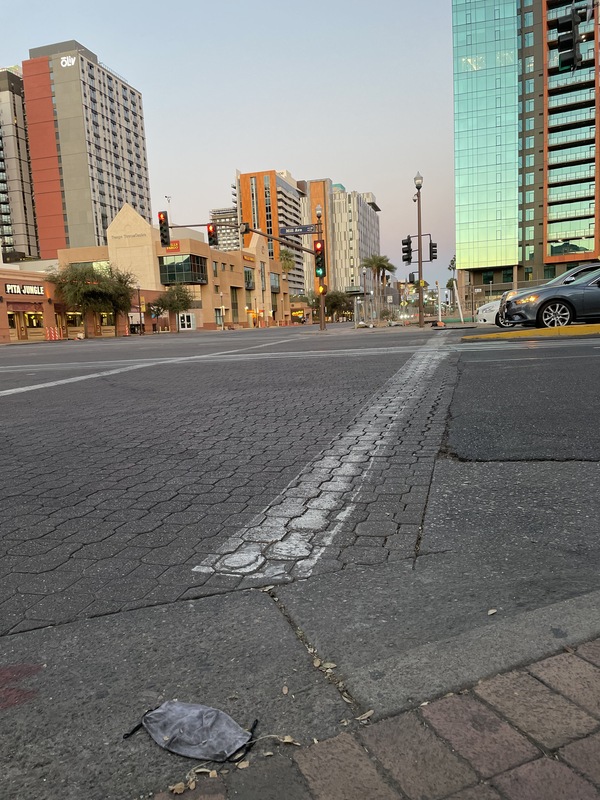
2021-03-04
Fabric mask spotted on the corner of Mill and University near Campus.
-
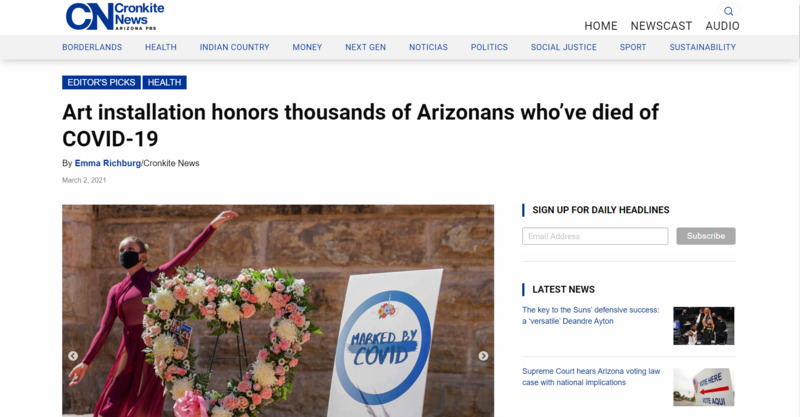
2021-03-02
Artist Kristina Libby and the Arizona nonprofit Marked by COVID teamed up to create a COVID-19 memorial. The memorial features a digital art piece showing flower petals falling from a rose. Each petal represents one person, and every two seconds represents one day. Libby also started the Floral Heart Project, another flower art project honoring COVID-19 victims.
-
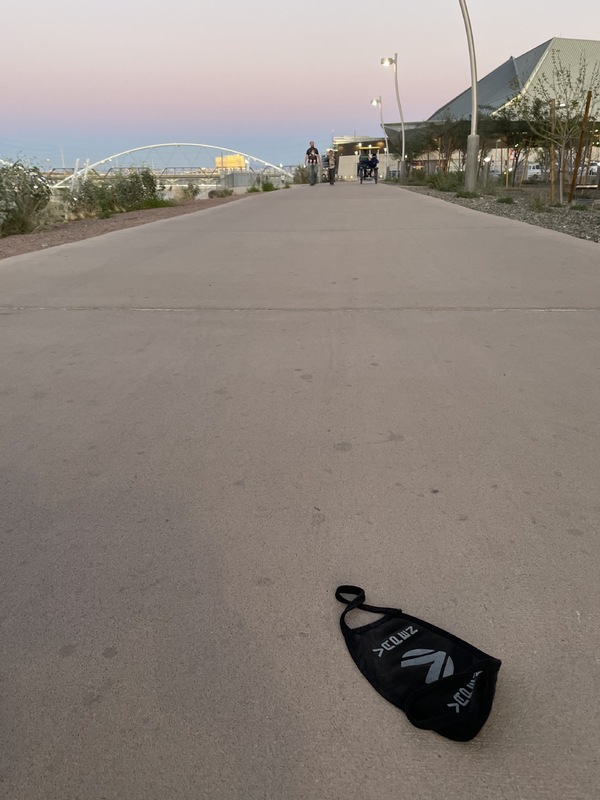
2020-03-01
Mondays are "no media Mondays," at our house. I went out with the family to the river walk along Rio Salado. On our way back to the car, I found this black, fabric, reusable mask on the path just down from the Tempe Center for the Arts.
-
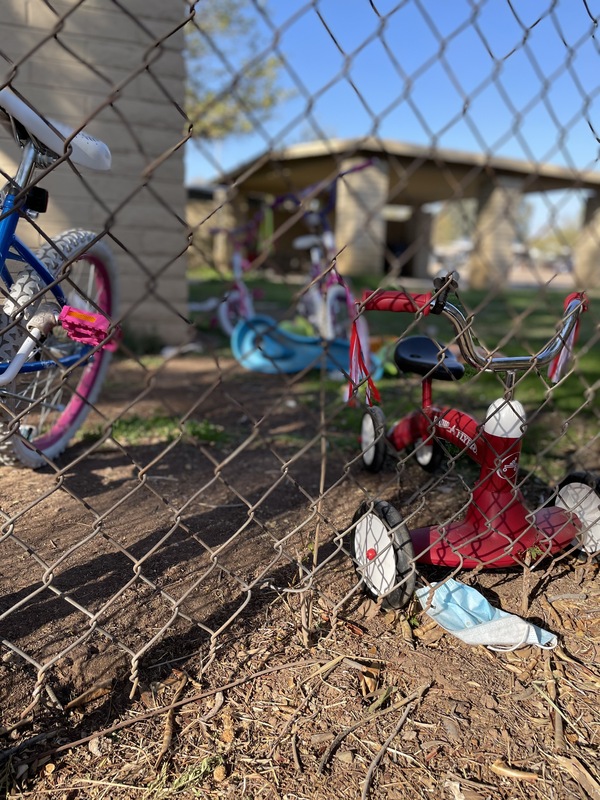
2020-02-27
Disposable masks are everywhere, I found this one stuck in my neighbor's fence.
-
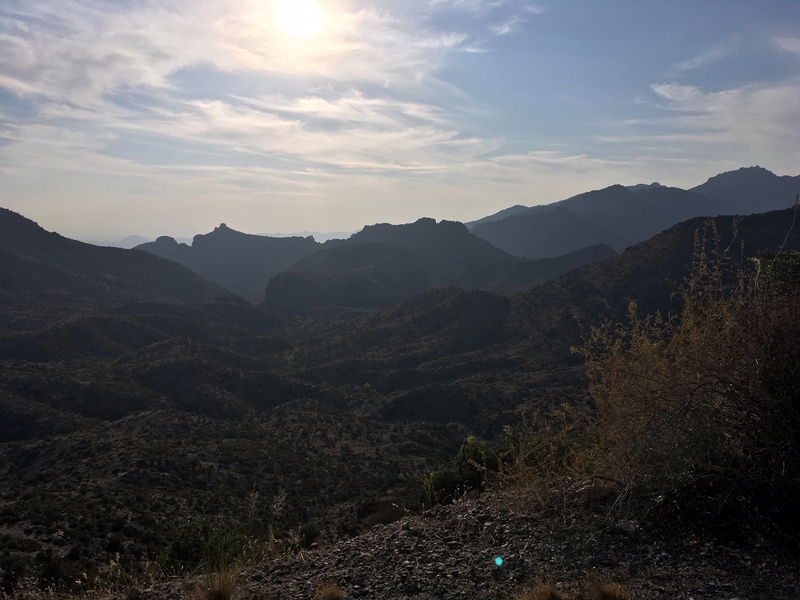
2021-02-16
This photograph of desert mountains in Tucson, Arizona, USA, shows the beauty and the power of nature. The image is associated with our creation of an Environment collection in the archive. We seek to collect stories about the environment: how it has been impacted by the pandemic, with changes in pollution levels, increased levels of trash, and alterations in human interactions, and how humans have interacted with the environment during the pandemic, using it decrease stress, get out of the house, grow food, and gain a greater knowledge and appreciation of it.
-
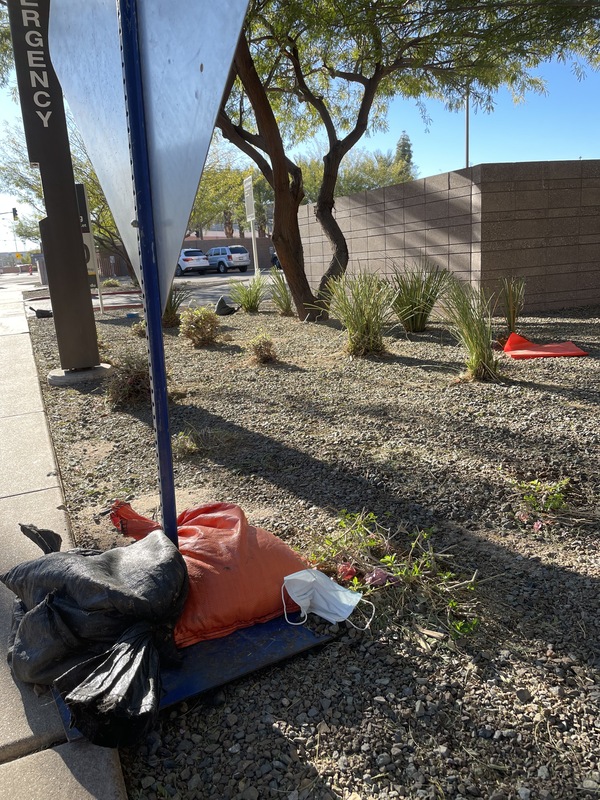
2021-02-22
Disposable mask spotted en route from the Tempe transit center to the Childhood Development (Psychology building) on Campus along Veteran's Way. 33°25'21.0"N 111°55'45.3"W
-
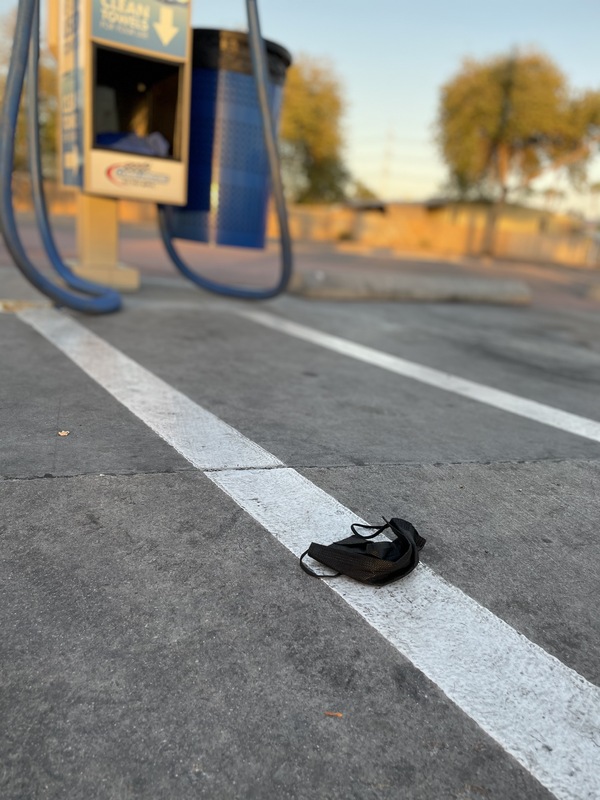
2021-02-20
I saw this black, disposable mask while vacuuming my van on Saturday at Cobblestone Auto Spa. I picked it up and threw it away before it blew into the water channel.
-
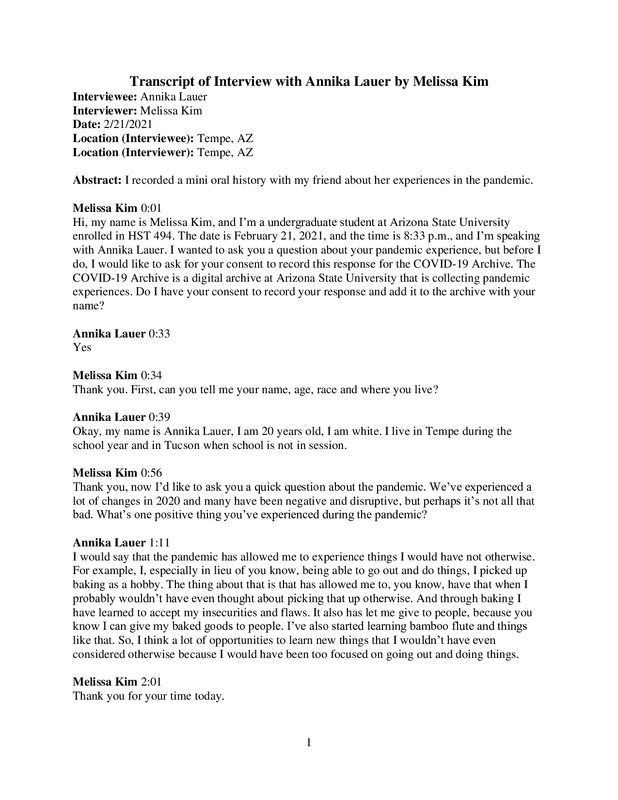
02/21/2021
I recorded a mini oral history with my friend about her pandemic experiences
-
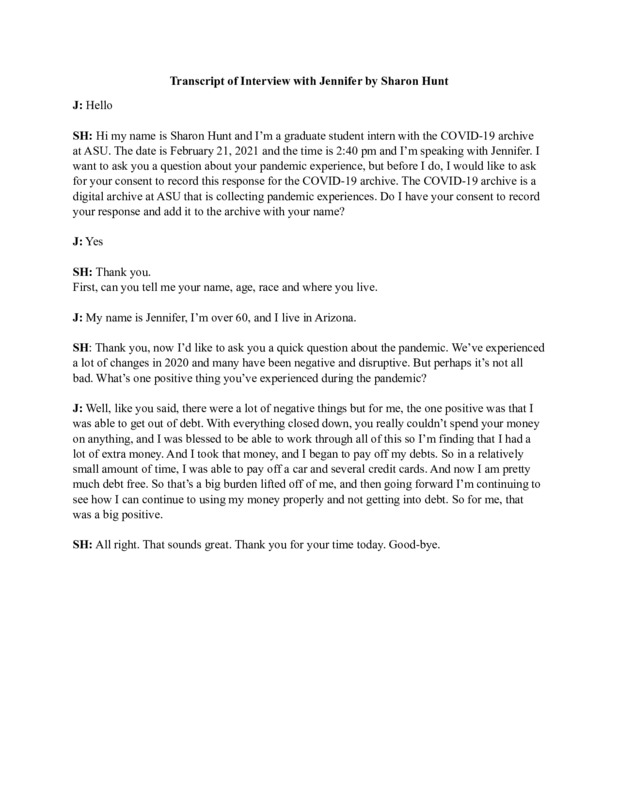
2021-02-21T14:40
Transcript of Interview with Jennifer by Sharon Hunt
Interviewee: Jennifer
Interviewer: Sharon Hunt
Date: 2/21/21
Location (Interviewee): Tucson, Arizona
Location (Interviewer): Tucson, Arizona
Transcriber: Sharon Hunt
Abstract:
Jennifer lives in Tucson, Arizona, and spoke about a positive result of the pandemic that she has experienced. She has been able to save money and pay off debts during this time period, as she has not been able to go out and shop or go to restaurants as she did in pre-pandemic times.
-
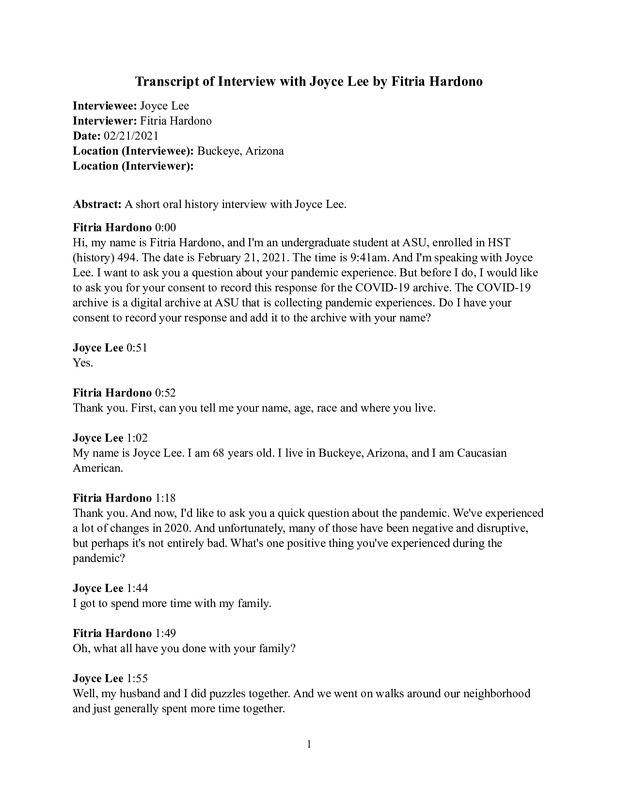
02/21/2021
Mini Oral history interview with Joyce Lee
-
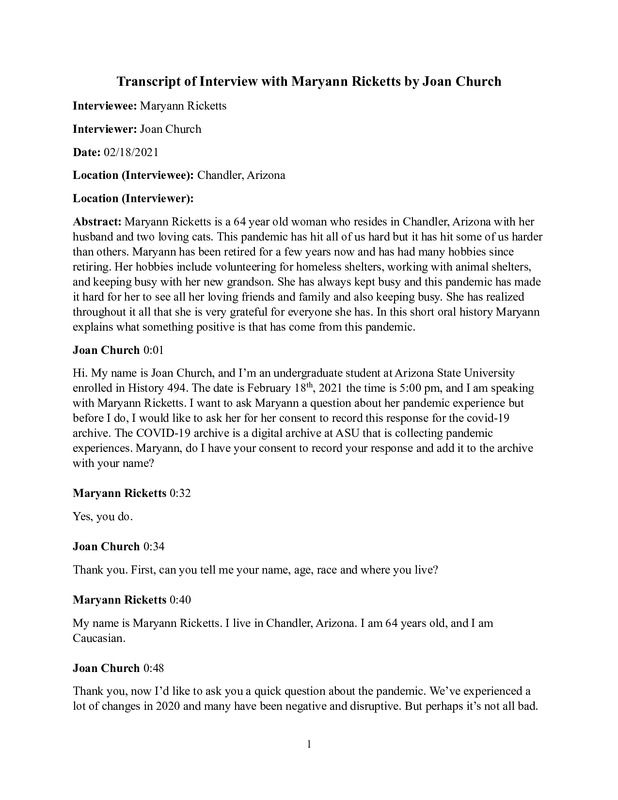
02/18/2021
Maryann Ricketts is a 64 year old woman who resides in Chandler, Arizona with her husband and two loving cats. This pandemic has hit all of us hard but it has hit some of us harder than others. Maryann has been retired for a few years now and has had many hobbies since retiring. Her hobbies include volunteering for homeless shelters, working with animal shelters, and keeping busy with her new grandson. She has always kept busy and this pandemic has made it hard for her to see all her loving friends and family and also keeping busy. She has realized throughout it all that she is very grateful for everyone she has. In this short oral history Maryann explains what something positive is that has come from this pandemic.
-
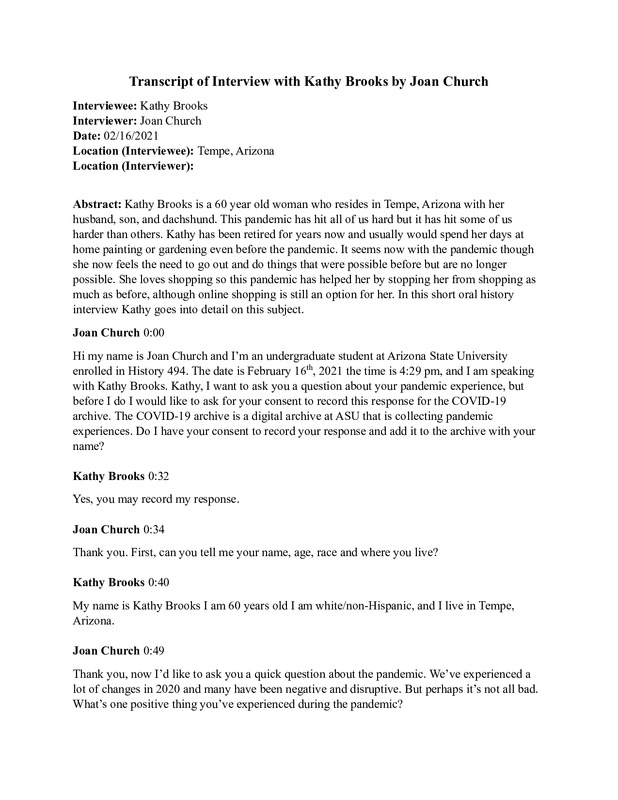
02/16/2021
Kathy Brooks is a 60 year old woman who resides in Tempe, Arizona with her husband, son, and dachshund. This pandemic has hit all of us hard but it has hit some of us harder than others. Kathy has been retired for years now and usually would spend her days at home painting or gardening even before the pandemic. It seems now with the pandemic though she now feels the need to go out and do things that were possible before but are no longer possible. She loves shopping so this pandemic has helped her by stopping her from shopping as much as before, although online shopping is still an option for her. In this short oral history interview Kathy goes into detail on this subject.
-
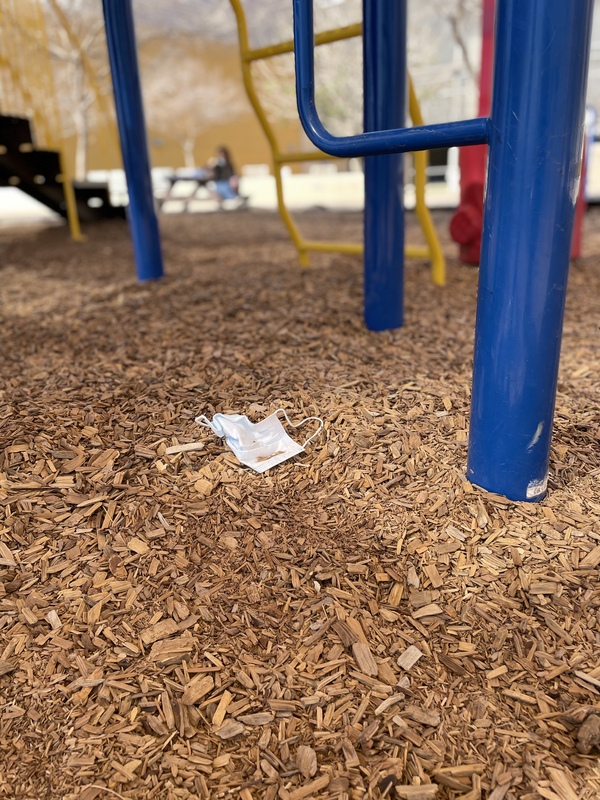
2021-02-20
Mask trash on the playground at the Kroc Center in Phoenix, AZ
-
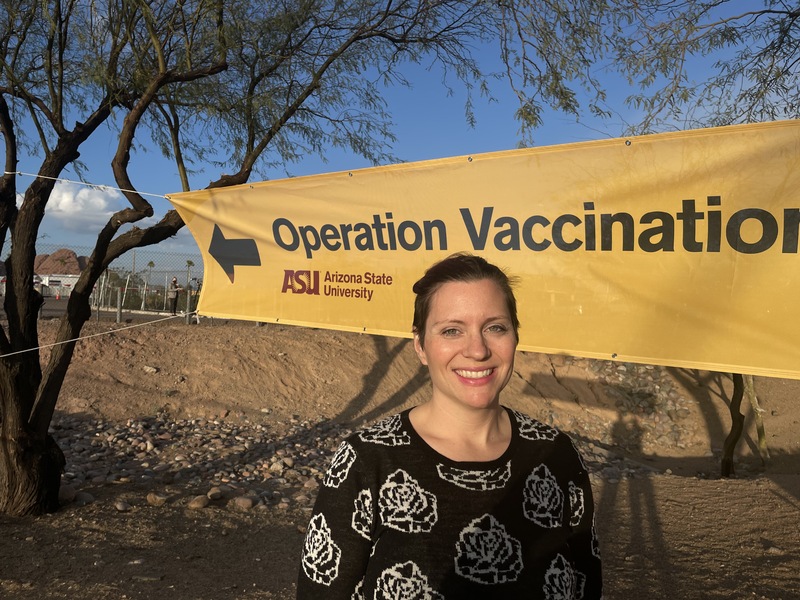
2021-02-19
ASU is now vaccinating people on campus. Members of the ASU community receive an email when they are eligible. I am eligible and have tried making an appointment twice, but the appointments are always full. After you get a vaccine, employees are supposed to upload a copy of their vacine to an ASU website.
-
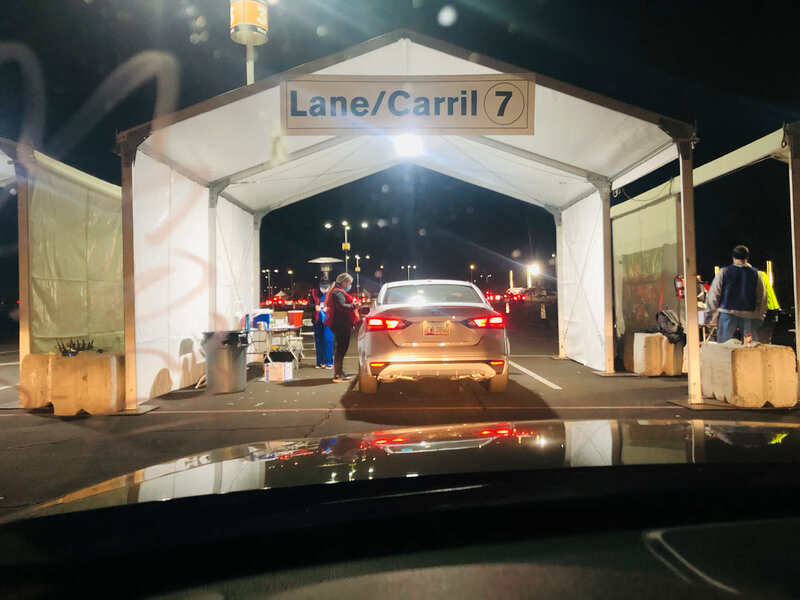
2021-01-15
As the vaccines were getting rolled out in Arizona, we were excited to learn that Arizona State University faculty fit into category 1B, as teachers. When the Arizona Patient Portal opened for 1B appointments on January 11 we dropped by the site at lunchtime, worried that we'd missed our opportunity. As luck would have it there were appointments available on January 15 at State Far Stadium in the wee hours of the morning. We were surprised as we'd heard the rollout of the site had met with difficulties earlier in the morning; we chose the a time just after midnight on the morning of the 15th, rather than at 4am (which seemed just too awkward.)
On the 15th, we were antsy and hoped that the wait would not be too long; we decided to leave a bit early for the stadium, which is an hour drive from our home. As we arrived, we saw the shining portable lights of the vaccination center, just south of the stadium, in a parking lot. We navigated to the entrance and were delighted that nobody appeared to be waiting. Volunteers directed us through an elaborate maze of lanes, and traffic cones. (Many of my friends, in fact, served as volunteers, partly out of civic duty and partly to get the vaccine.) We showed one registrar our appointment slips (from the state website), and he wrote our appointment numbers on the window of my car (in either sharpie or wax pencil). We briefly waited in another line, as two registrars sitting under portable heaters that are so common on chilly winter nights in Arizona (normally you'd encounter them at restaurants.) They checked our identification and entered our names into the system, as well as asked about our health. From there we were directed around more cones into traffic lanes, leading up to where the vaccinations were delivered. Again, after a brief wait, and more checking our registration--confirming our appointment numbers (written on the windows) and names--we entered a tent. Two nurses briefed us on the vaccine and delivered our shots. They directed us to a waiting area, where we were asked to wait 15 minutes in case of an adverse reaction.
And, voila, it was over--in under an hour.
-
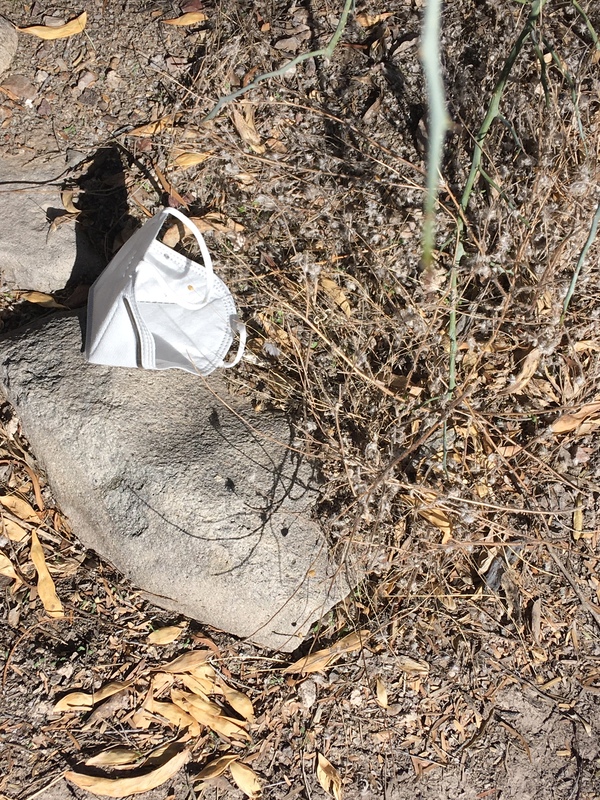
2021-02-07T18:36
This is a photograph of a mask discarded on the side of my yard, in the desert where many animals such as coyotes, quail, javelinas, and rabbits make their homes. I have seen much pandemic-related trash discarded on the sides of the road, on sidewalks, and in people’s yards during this pandemic: hand sanitizer bottles, masks, wipes, etc. With the pandemic has come an increase in the use of disposable materials such as these, adding to environmental degradation and displaying a disregard both for people and for animals. This photo of mask trash shows a toxic side effect of the pandemic and a reminder that people need to use non-disposable items whenever possible and show respect for our natural environment by not throwing things away in this manner.
-
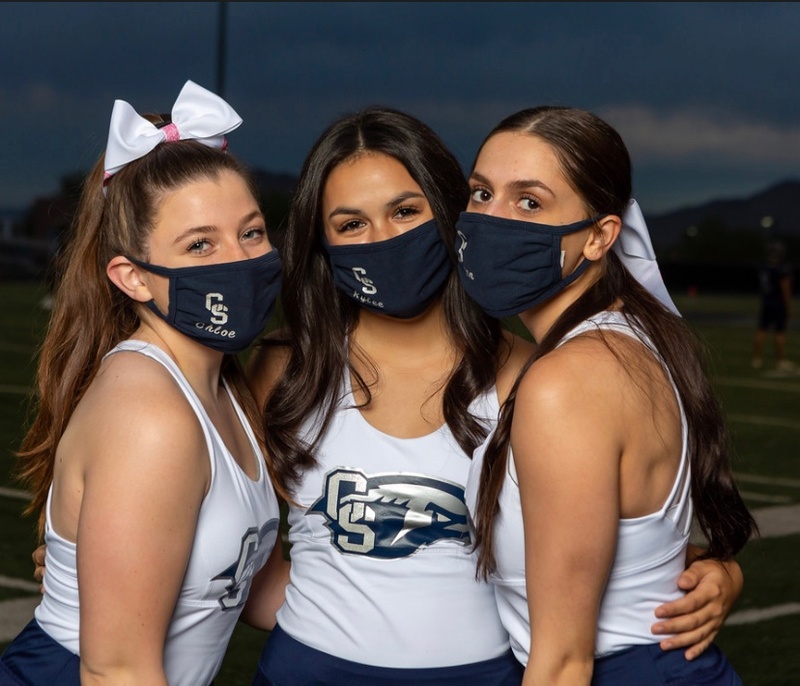
2020-11-13
Fall high school sports in Arizona were delayed and in some cases canceled completely. My daughter, an 11th grader at Cactus Shadows High School, is on the cheer team and was disappointed not to have her usual, very full cheer season. Football games finally were allowed to happen, and four home games were put on the schedule. They ended up only playing 3 due to quarantines with both our own team and opponents, and they were allowed to attend one away game. Our school is also known for a very rowdy and fun student section, so it was sad to be at the game without students in the stands, and only four spectators per athlete. At least they got to cheer- even in masks- and got some semblance of a football season.
-
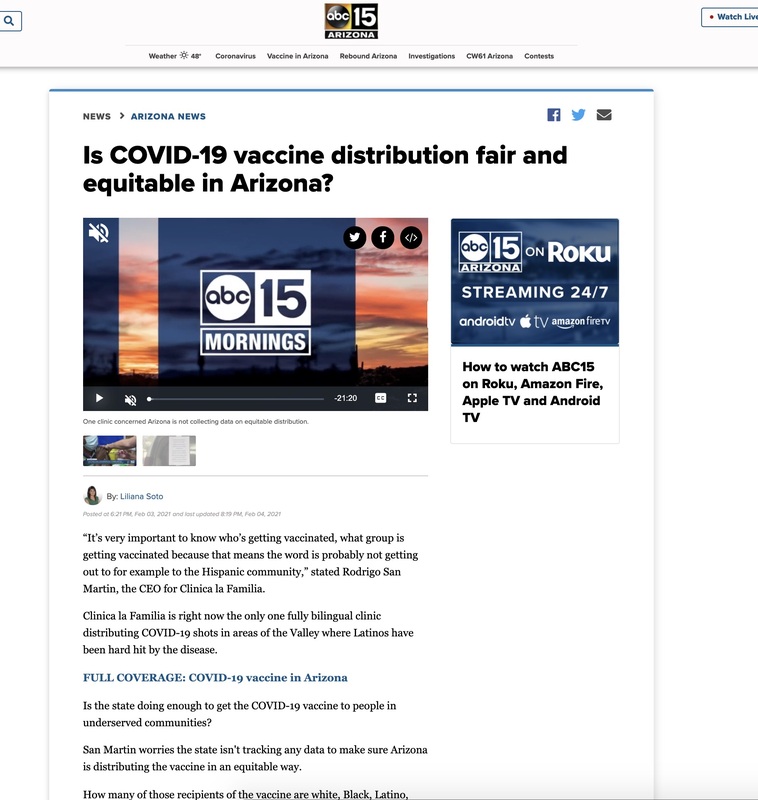
2021-02-03
Minorities have been hard hit by COVID-19 and some want to ensure that they are receiving the vaccine. However, some states, like Arizona, are not providing that information. It is unclear whether the demographics data isn't being collected or if the information just isn't being released to the public.
-
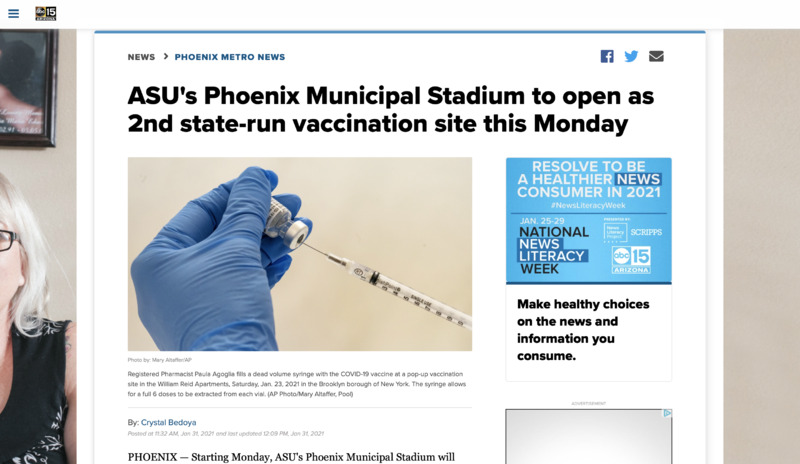
2021-01-31
Already more than a month into Arizona's vaccination program, the state has just announced its second vaccination site for the Phoenix area, one of the largest metro areas in the US. The rollout has been slow, with only a little more than half of one million people having received the vaccine as of 30 January, 2021.
-
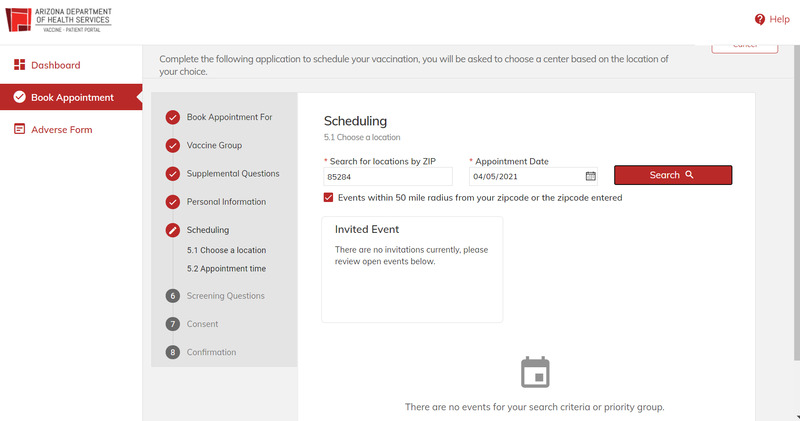
2021-02-28T10:55
This picture shows what I get when I try to schedule a COVID-19 vaccination through the Arizona Department of Health Services website. I'm basically out of luck for the time being. It is good that a vaccine is available now and the end of the pandemic is in sight, but the process is frustrating.
While I understand that our state agency had to develop their website in a short time, they've known for months that vaccines were on the way. Their site is needlessly complex, buggy, and non-informative. I initially got hung up on a page that required me to enter my health insurance information; it took several tries and a few phone calls to figure out exactly what I needed to enter in each of the fields.
Once I get through, I can't find an open appointment. There is no indication on the webpage, but it seems that the system returns no open appointments for me because I am not yet eligible. My mother who is more than 75 years old has managed to get an appointment and get her first shot.
I'm concerned that many other people, particularly the elderly who need the vaccination more than others, will not get access to them because they will not be able to navigate through the website. I have read a number of media reports about this. It seems like poor planning to set up a process that relies on individuals to use the internet without offering an alternative.
-
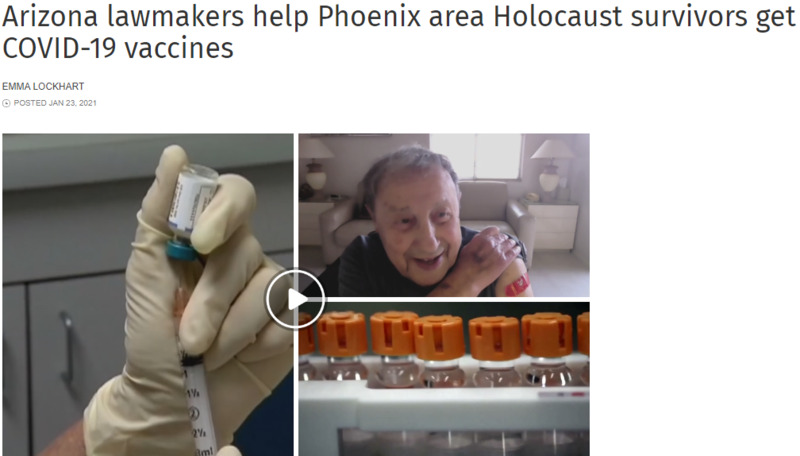
2021-01-24
97-year-old Alexander White, a Holocaust survivor, got a vaccine with a push from Arizona lawmakers.
-
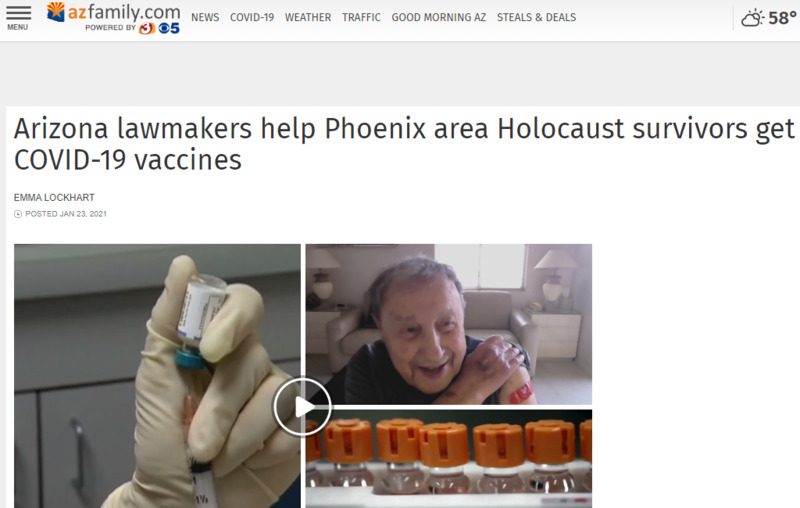
2021-01-24
97-year-old Alexander White, a Holocaust survivor, got a vaccine with a push from Arizona lawmakers.
-
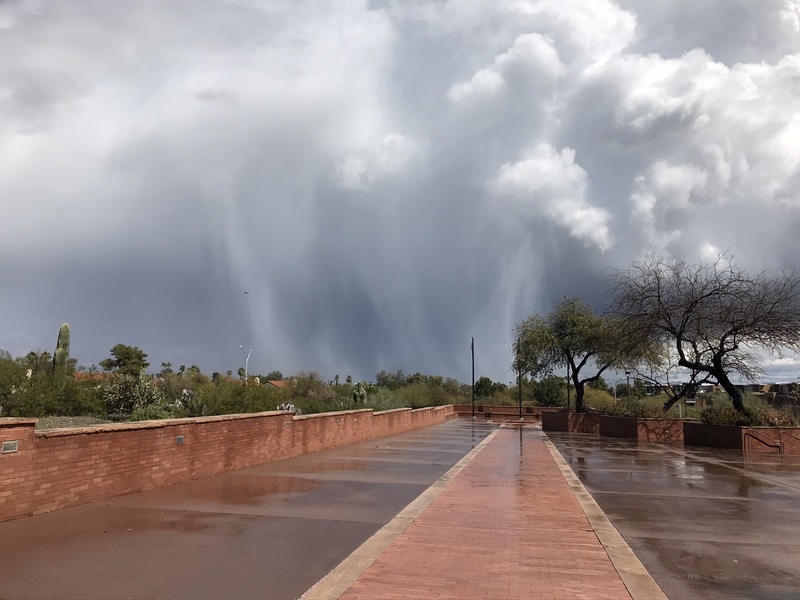
2020-03-13T13:54
This photo was taken a few minutes before 1:00 PM on Friday, March 13, 2020 at the Arizona Historical Society Heritage Center in Tempe. That day stands out as the day everything started shutting down due to COVID-19. I had set out for an appointment in downtown Phoenix, but found out it had been cancelled when I was about halfway there. I got my Lyft driver to change course and head to the Heritage Center instead so that I could take care of some other business. As all this was happening, a rather freakish thunderstorm broke out. That same day, my son received an email from the University of Arizona advising him not to return from Spring Break, and I found out that Arizona State University would conduct all classes on line for the rest of the semester. The following Monday, my wife was sent home early to work remotely and has continued to do so ever since. Looking back after ten months of the pandemic (whoever dreamed it would go on this long?), this picture symbolizes the start of the whole chaotic ordeal.
-
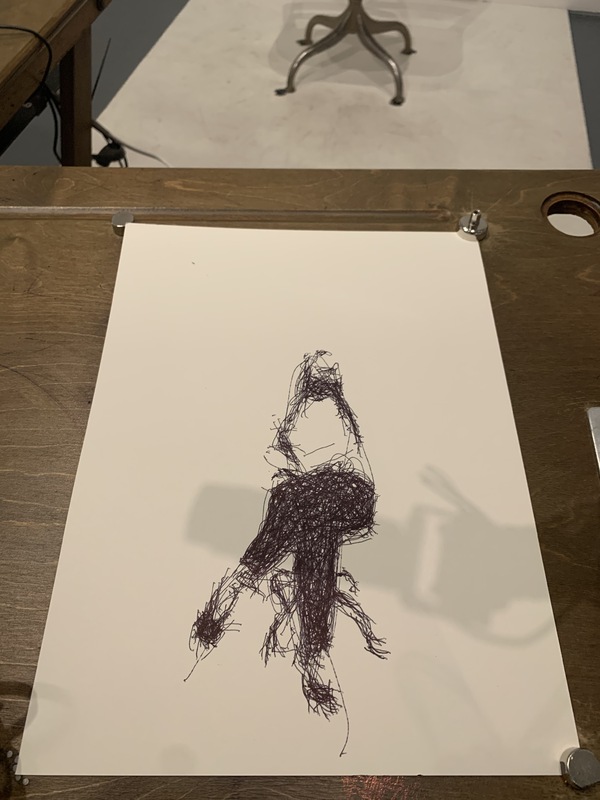
2020-12-07
In October, my friend and I decided to go to the Wonderspaces art instillation in Scottsdale. They had a new interactive experience where a robot would draw you. They were adamant in telling us that we must leave our masks on the entire time, or we would be asked to leave. It was interesting to be around everyone in masks enjoying art but with out acknowledging each other. What you see is the end product. forever a memory of this pandemic.
-
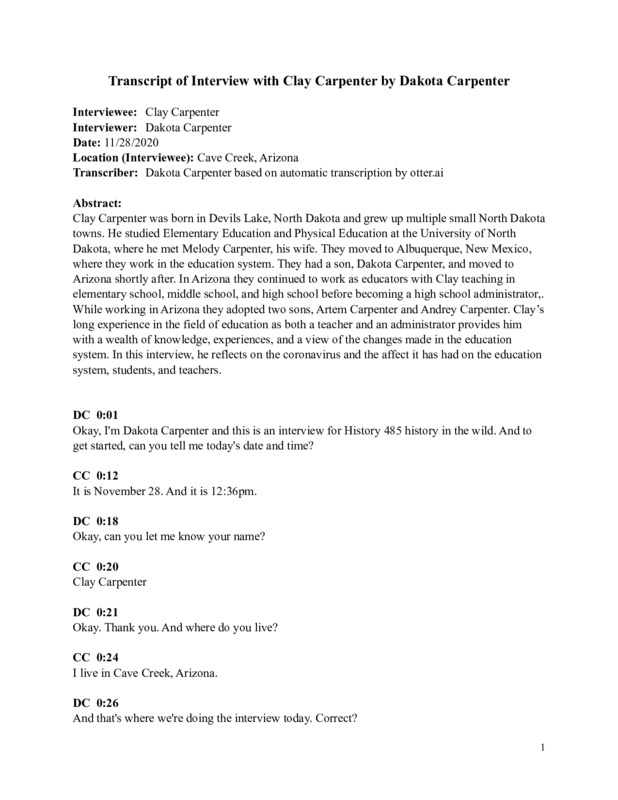
11/28/2020
This is an interview with Clay Carpenter. Clay Carpenter was born in Devils Lake, North Dakota and grew up multiple small North Dakota towns. He studied Elementary Education and Physical Education at the University of North Dakota, where he met Melody Carpenter, his wife. They moved to Albuquerque, New Mexico, where they work in the education system. They had a son, Dakota Carpenter, and moved to Arizona shortly after. In Arizona they continued to work as educators with Clay teaching in elementary school, middle school, and high school before becoming a high school administrator,. While working in Arizona they adopted two sons, Artem Carpenter and Andrey Carpenter. Clay’s long experience in the field of education as both a teacher and an administrator provides him with a wealth of knowledge, experiences, and a view of the changes made in the education system. In this interview, he reflects on the coronavirus and the affect it has had on the education system, students, and teachers.
-
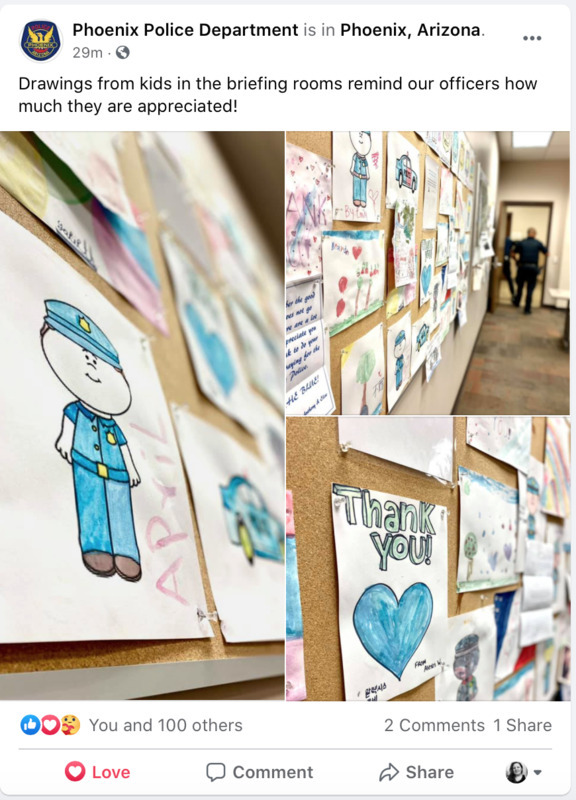
2020-11-22
Over the past 14 weeks, I have had the opportunity to work on The Journal of the Plague Year digital archive with Arizona State University. I learned a vast amount over the course of the internship, such as how to write press releases, collection plans, blog posts and other forms of advertising for the archive. I also learned about the ins and outs of archiving and the behind-the-scenes considerations that are involved in building and maintaining an archive.
This was my very first graduate school class and as such, I wasn’t sure that starting with an internship was the best idea, but after the first week or two I realized that this was the perfect way to start, since it was basically getting a preview of the type of work someone in the public history field would be doing and I got very excited, determined that this was the type of career I wanted to pursue.
The writing for publication skills that I have started to develop, I think will be extremely valuable as those skills are not just applicable to public history, but any career field really. The oral history project also provided the opportunity to work on my interviewing skills. Oral histories are vital to the study of history and even though this is an area I still need to work on, at least now I have the basic foundation to build on.
For my collection within the archive, I chose to focus on Law Enforcement, as that is a community that is near and dear to my heart. I currently work in law enforcement and I have family that does as well. When we discussed silences in our weekly readings, we talked about how to identify silences and how to work towards filling them. I noted that there were very few if any, submissions to the archive from the perspective of law enforcement so I wanted to work towards filling that silence.
Overall, this internship was a great experience and entry into both the public history field and graduate studies. I know that the skills I have developed here will serve me well as I continue my graduate studies!
-
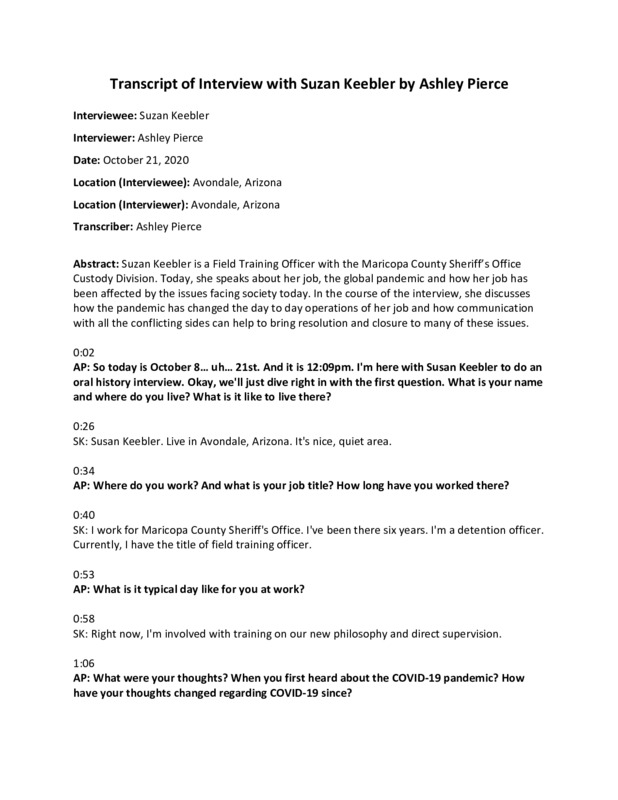
10/21/2020
Suzan Keebler is a Field Training Officer with the Maricopa County Sheriff’s Office
Custody Division. Today, she speaks about her job, the global pandemic and how her job has
been affected by the issues facing society today. In the course of the interview, she discusses
how the pandemic has changed the day to day operations of her job and how communication
with all the conflicting sides can help to bring resolution and closure to many of these issues.
-
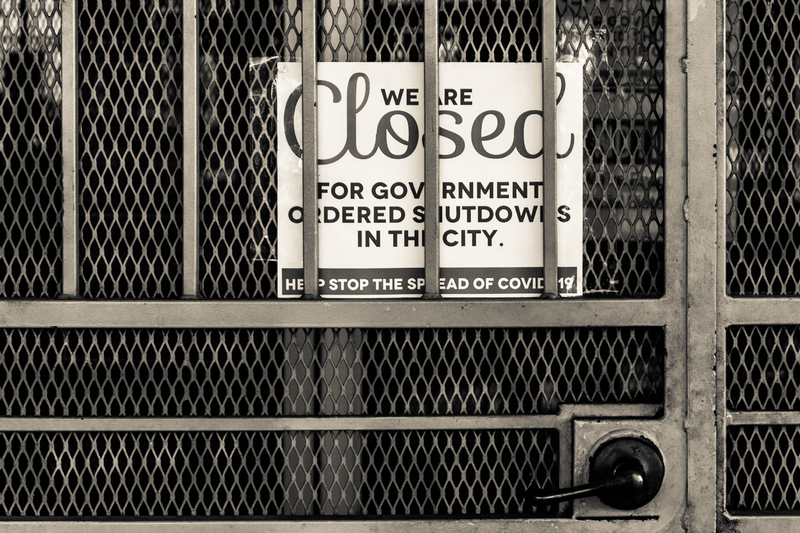
2020-09-17
From March through August, I walked through the environs of downtown Tucson to make images capturing the effect of the pandemic.
-
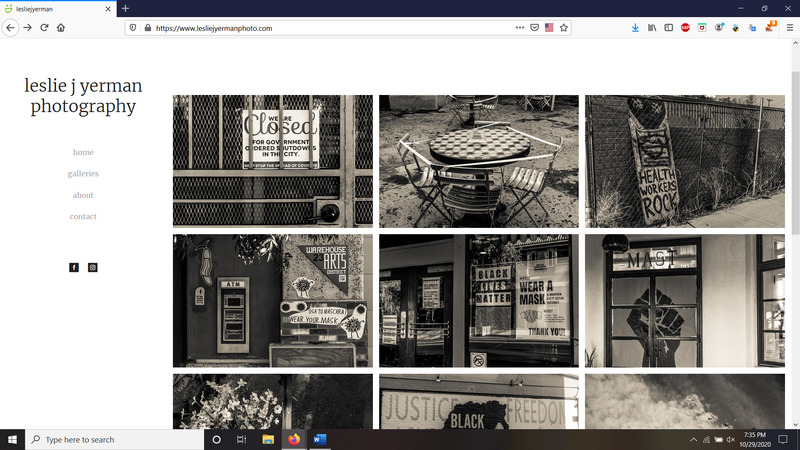
2020-09-16
From March through August, I walked through the environs of downtown Tucson to make images capturing the effect of the pandemic. After the murder of George Floyd, I also documented the aftermath of the resultant demonstrations during the end of May and June.
-
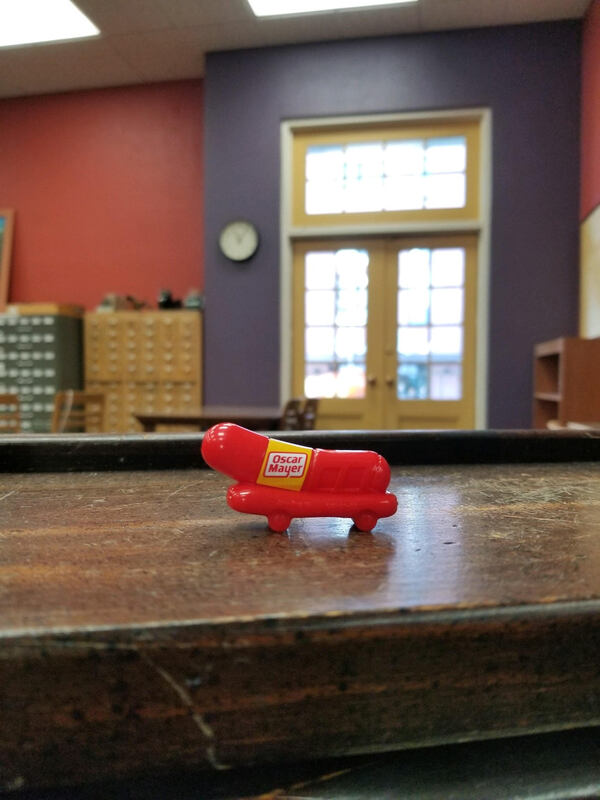
2020-10-20
After 7+ months of isolation and with our museum closed to the public for most of this year, my coworker and I - archivists at the Arizona Historical Society in Tucson - were delighted to look out the library window and see the Oscar Mayer Wienermobile parked in front of the newly-opened hotel across the street. And to preface this story - this hotel just opened during a pandemic after construction delays all year, and working across the street we've been subjected to the horribly annoying sounds, smells, and dust of construction ALL DAY LONG for this entire year. But as soon as our last researchers left the museum, we raced outside to take pictures with some of the other museum staff. The amount that the unexpected visitor has made us laugh this week has really brought out how tough this year has been on us all mentally, so much so that the tiniest thing has made us smile more than we have in months (and despite the fact that we're all die-hard opponents of capitalism and I'm a vegetarian).
-
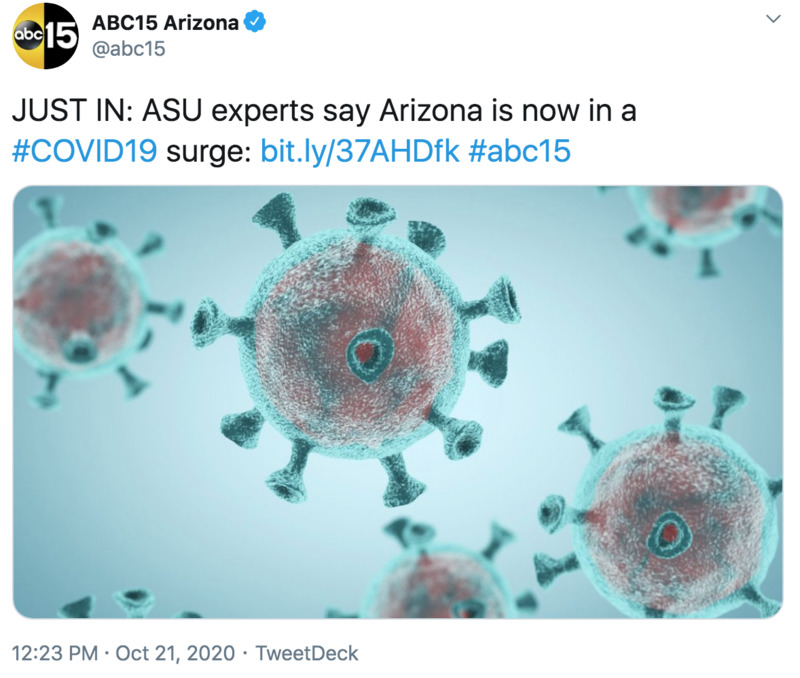
2020-10-21
Arizona is seeing a surge in its cases again as winter approaches. The state is nearing 1,000 new cases a day with hospitalizations and ventilator usage is increasing.
-
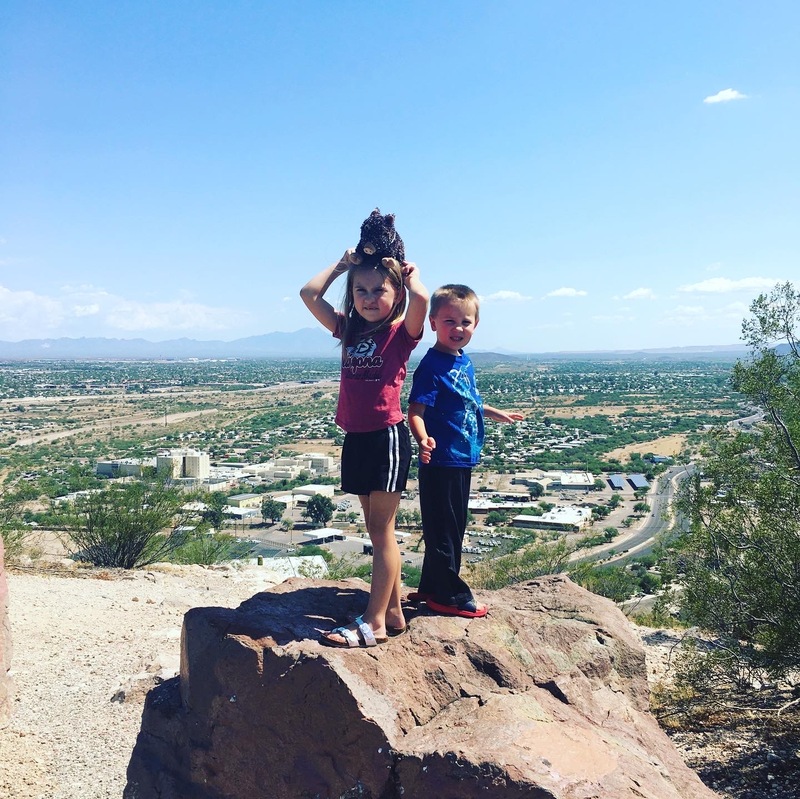
2020-08-07
We had to find ways to beat cabin fever, and that was hard because it was the hottest summer on record in Arizona. We took mini trips to Sedona, Tucson, and Camp Verde. We hiked and did as much outside as we could on cooler days. The kids enjoyed taking trips, because they couldn't see their friends or play with them during the lockdown.
-
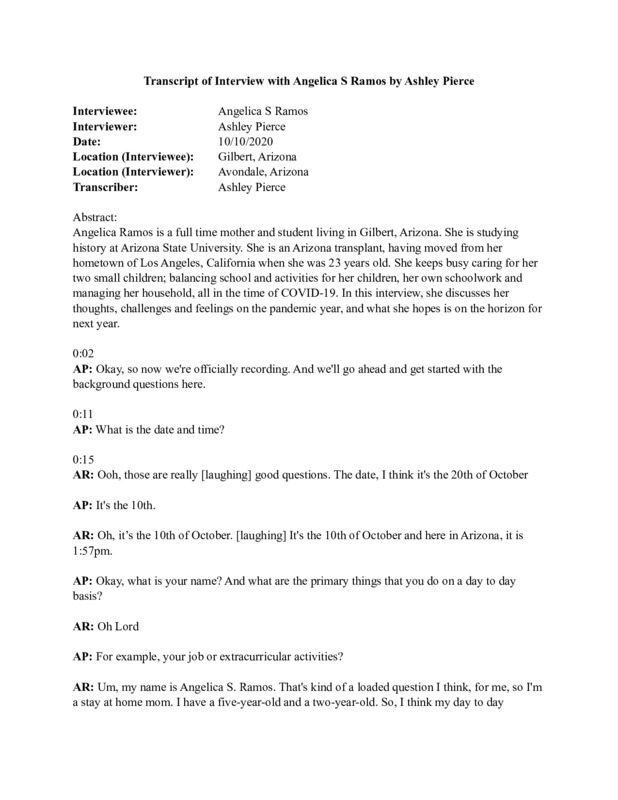
10/10/2020
Angelica Ramos is a full time mother and student living in Gilbert, Arizona. She is studying history at Arizona State University. She is an Arizona transplant, having moved from her hometown of Los Angeles, California when she was 23 years old. She keeps busy caring for her two small children; balancing school and activities for her children, her own schoolwork and managing her household, all in the time of COVID-19. In this interview, she discusses her thoughts, challenges and feelings on the pandemic year, and what she hopes is on the horizon for next year.
-
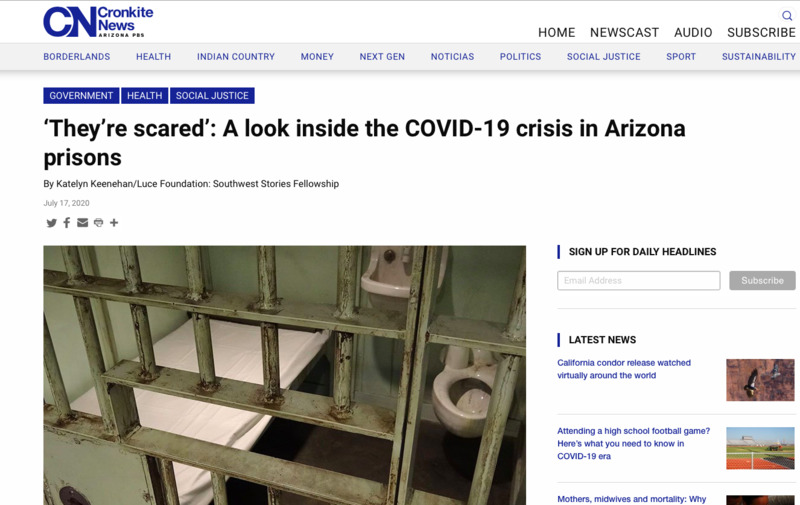
2020-07-17
As COVID-19 began to spread across the Southwest in March, lawyers representing incarcerated Arizonans reported “unsanitary conditions,” “inadequate medical staffing and treatment” and a “failure to take strong and sensible precautionary measures” in state prisons.
The combination left prisoners “highly vulnerable to outbreaks,” the attorneys wrote in a letter to the state before asking a federal judge to intervene. The judge did by issuing an order for officials to release more information, but prison advocates say it hasn’t been enough.
Nearly four months later, complaints of insufficient safety measures and subpar medical care continue to plague Arizona prisons. At least 569 prisoners at 13 of the state’s 16 prison complexes had tested positive for COVID-19 as of July 15, according to the Department of Corrections, Rehabilitation and Reentry, and at least 371 staffers have reported positive results.
Justice reform advocates and others with ties to the correctional system worry the state is running out of time to prevent an even more dangerous surge in cases. COVID-19 can spread swiftly in crowded indoor spaces and among individuals with chronic health problems.
-
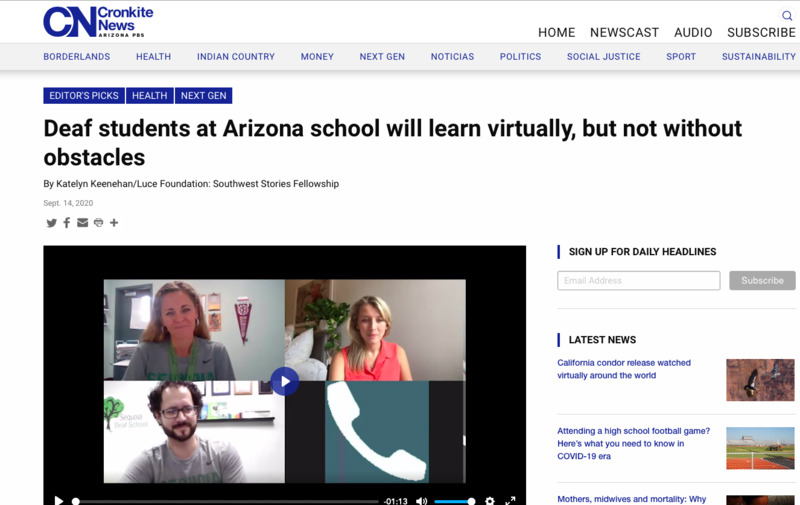
2020-09-14
Amid the COVID-19 pandemic, students are adjusting to their new normal when it comes to online classes, virtual events and social distancing to prevent the spread of the disease.
But for deaf and hard of hearing students in Arizona public schools, as well as for many more enrolled in private schools, these adjustments introduce new barriers to communication and learning. Last year, according to the Arizona Department of Education, 1,622 deaf or hard of hearing students were in public schools.
Sequoia Deaf School, part of the Edkey Inc. charter school group in Mesa, had 52 students enrolled in grades K through 12 for the 2020-21 school year. Its experience navigating the pandemic illustrates some of the challenges deaf students face, such as difficulty reading lips and faces behind masks, the shorter attention spans of young deaf students and the loss of their nurturing school community.
-
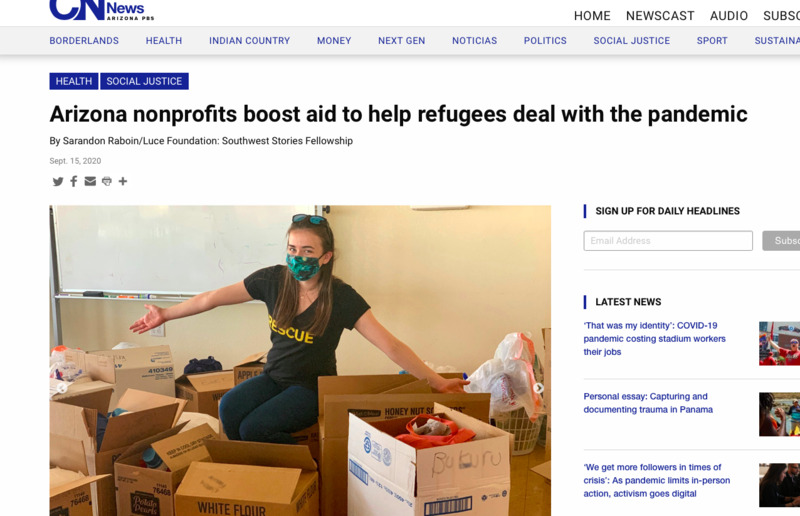
2020-09-15
By Sarandon Raboin/Luce Foundation: Southwest Stories Fellowship
-
2020-09-20
by Jessica Myers for the Luce Foundation: Southwest Stories Fellowship
 2021-03-16
2021-03-16 2021-03-17
2021-03-17 2021-03-16
2021-03-16 2021-03-16
2021-03-16 2021-03-16
2021-03-16 2021-03-15
2021-03-15 2021-03-15
2021-03-15 2020-03-08
2020-03-08 2020-05-16
2020-05-16 2021-03-06
2021-03-06 2021-03-06
2021-03-06 2021-03-04
2021-03-04 2021-03-04
2021-03-04 2021-03-02
2021-03-02 2020-03-01
2020-03-01 2020-02-27
2020-02-27 2021-02-16
2021-02-16 2021-02-22
2021-02-22 2021-02-20
2021-02-20 02/21/2021
02/21/2021 2021-02-21T14:40
2021-02-21T14:40 02/21/2021
02/21/2021 02/18/2021
02/18/2021 02/16/2021
02/16/2021 2021-02-20
2021-02-20 2021-02-19
2021-02-19 2021-01-15
2021-01-15 2021-02-07T18:36
2021-02-07T18:36 2020-11-13
2020-11-13 2021-02-03
2021-02-03 2021-01-31
2021-01-31 2021-02-28T10:55
2021-02-28T10:55 2021-01-24
2021-01-24 2021-01-24
2021-01-24 2020-03-13T13:54
2020-03-13T13:54 2020-12-07
2020-12-07 11/28/2020
11/28/2020 2020-11-22
2020-11-22 10/21/2020
10/21/2020 2020-09-17
2020-09-17 2020-09-16
2020-09-16 2020-10-20
2020-10-20 2020-10-21
2020-10-21 2020-08-07
2020-08-07 10/10/2020
10/10/2020 2020-07-17
2020-07-17 2020-09-14
2020-09-14 2020-09-15
2020-09-15